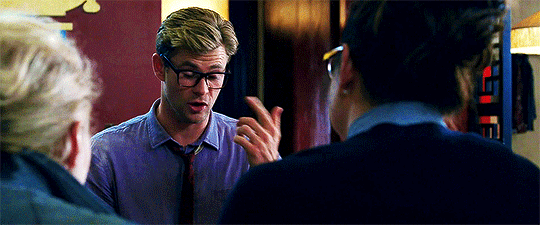 |
Gender-flipping the script would solve some of the power dynamic issues of the original, in which Dana has basically no choice but to put up with Venkman's creepy come-ons in the hope that the Ghostbusters can help her, but Feig and co-writer Katie Dippold have done more than simply cast women in a "man's story." In this one regard, the Internet armchair critics were right: this isn't your childhood Ghostbusters.
It's way better.
 |
It's smarter.
Yeah, I know them's fightin' words.
There's a specific and fundamentally different resonance to these Ghostbusters being women. Women are very familiar with having our narratives ignored, with being told we don't know what we're doing, with being told we don't really even understand our own lives, let alone the world at large. Ghostbusters not only acknowledges this fact, it centers the movie around it.
That everyday trauma is the reason that Dr. Erin Gilbert (Kristen Wiig) has spent her career running from acknowledging her past. As a child, she saw a neighbor's ghost in her bedroom for over a year. The only person to believe her was her high-school friend Abby Yates (Melissa McCarthy), with whom she wrote a book (hilariously titled Ghosts from Our Past: Both Literally and Figuratively: The Study of the Paranormal). Eventually, the film implies, the exhaustion of having to defend her personal experience from the critics and bullies led Erin to give in and pursue the publicly (read: male) sanctioned path of professional academe, even at the expense of denying the truth of her own life. When she becomes a Ghostbuster, it's because she's determined to use science for validation. Unlike Abby and the delightfully demented Holtzman (Kate McKinnon), Erin deeply cares that people believe her, and she's initially willing to sacrifice her principles to prove herself. It's a genuinely moving moment when Erin confesses her ghost story to the rest of the gang and Patty (Leslie Jones) immediately says she believes her. (Holtzman may have some questions.)
 |
| Holtzman always has questions. |
The problem of uninterrogated white male privilege, in fact, lies at the center of the movie. New York's Mayor Bradley (Andy Garcia) is an idiot whose (female) assistant keeps him (mostly) together, but you have wonder how he ever got elected. (Or perhaps not, given the fact that a Tribble-haired sentient Cheeto is currently a strong candidate for the Presidency.) When smug debunker Martin Heiss (Bill Murray) turns up at the Ghostbusters' door unannounced and uninvited, he expects them to prove their story to him on the spot, and becomes irritated with their lack of "graciousness" (a virtue nearly always coded as female) when they don't do as he demands. (His comeuppance -- hoist with his own petard, as it were -- is incredibly satisfying.) Even Secretary Kevin, beautiful, bumbling Kevin, has no understanding of his own mediocrity. He genuinely believes that his graphic designs -- floating hot dogs, giant-boobed ghosts -- are perfect for his employers. He honestly thinks that pushing a bunch of buttons on the power box saved the day. ("Oh, sweet Kevin, the two are unrelated," Holtzman tells him, but it's clear she doesn't get through). Kevin will get what he wants at the end of the day because he's cute and inspires a certain protectiveness in actual adults, not because he's actually good at anything.
 |
| Okay, he's good at being cute. |
It's no coincidence that the "glory days of old New York" that Rowan uses his ghostly powers to create involve almost solely markers of masculinity. Ads for whiskey "for today's man" and movies such as "Fists of Fury" and "Taxi Driver" line the streets. I can't help reading the villain's misogynist nostalgia for the days when men dominated pop culture as a less-than-subtle jab at the disaffected douchebros who are so attached to "their" Ghostbusters that they're willing to burn shit down (on the internet, if nowhere else) rather than accept that women could be part of something popular that isn't porn.
If the new Ghostbusters has a major flaw, it's that things come almost too easily for our heroes, especially during the climactic ghost battle. Sure, the gang are wicked smart, but all the equipment works as it needs to when it needs to. Problems come up only to be solved immediately. New York never genuinely feels in peril because these four women are too supremely cool to let that happen. It smacks a little bit of wish fulfillment, and I can see critics taking issue with it, especially since Feig has a keen eye for the struggles of everyday dorks (witness his episodes of The Office or any of his movies with McCarthy). But honestly, I don't really have a problem with this, because it is wish fulfillment for a lot of viewers like me, and wish fulfillment is a valid goal of cinema. These women have been doubted and derided and denied all their lives, but they were always good at what they're passionate about, and it's delightful to see them realize that too. And heck, if Iron Man can be a genius with technological infallibility, why not the Ghostbusters?
 |
| You knew this was coming, admit it. |


